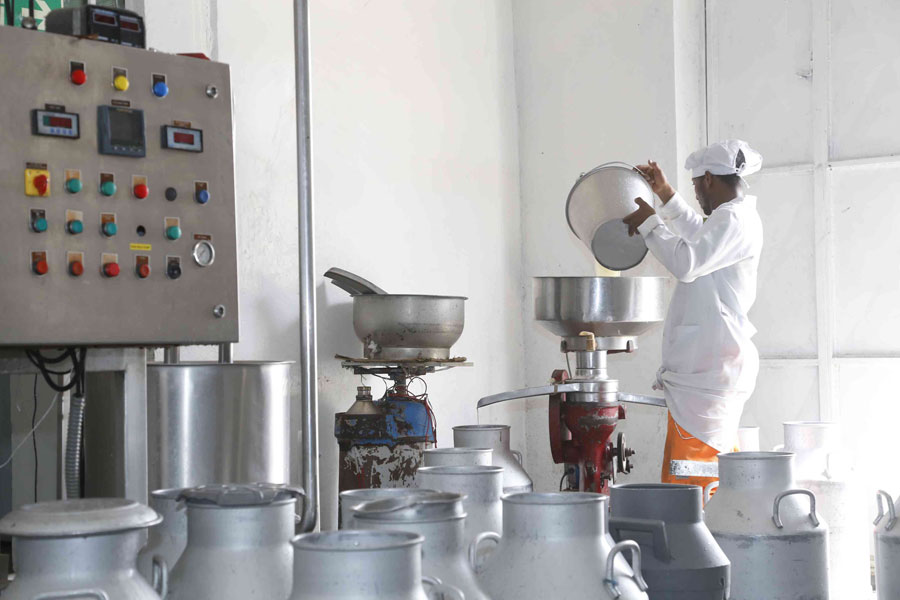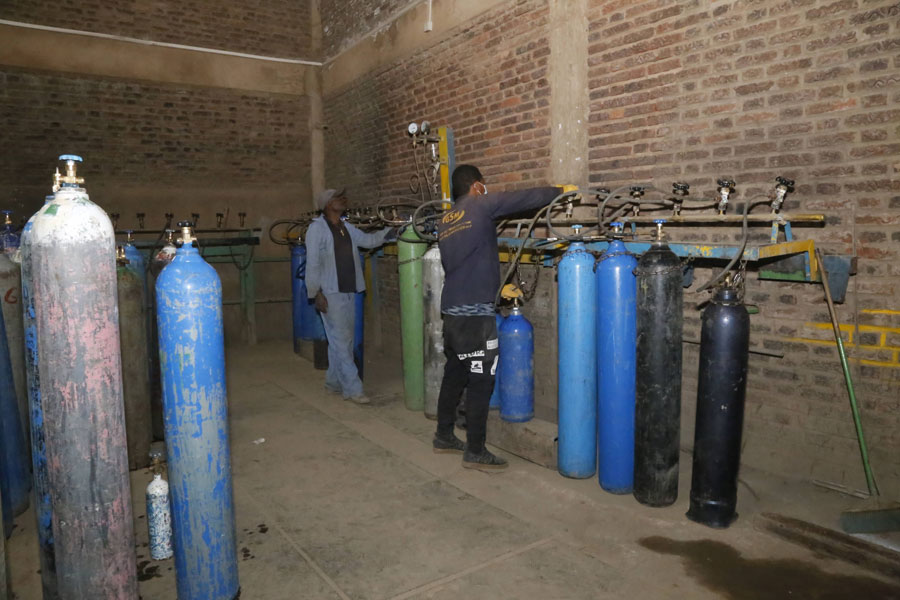
Fortune News | Feb 25,2023
Feb 22 , 2020
By Eden Sahle
It is unbearable to pass by Qera slaughterhouse, let alone to live and work in that neighbourhood. Ironically, it is found in close proximity to the head office of the African Union, which is one of the reasons behind why Addis Abeba is sometimes described as the political capital of Africa.
The clean and luxurious AU compound and the unhygienic and acrid area that announces the location of the slaughterhouse are only a few blocks apart. It serves as a contrast between what the capital pretends to be and what it is in reality.
For the most part, it has not mattered much that the residents are frustrated by the existence of the slaughterhouse. There have even been court cases against the state-owned abattoir, but to no avail. The community is angry at the neglect they face. They are fed up with living under such conditions.
They may be consoled in the construction of a new wastewater treatment plant for the abattoir. This could go some distance in improving the foul impact it has on the rest of the neighbourhood. Even more promising would be the construction of a new slaughterhouse to replace the current one in Qera. Unfortunately, controversy over land in the Nifas Silk Laphto District has meant that construction of the new abattoir, which would have cost two billion Birr, has been put off for a further three years.
Ethiopia is not short of a legal system and policies to protect the environment. The environmental law went to the extent of allowing public litigation to protect the interest of the public, although the practice is far from satisfactory. Ethiopia has also signed international conventions aiming to make the environment healthier.
The broad environmental policy of Ethiopia is specified in the supreme law of the land, guaranteeing the fundamental right to live in a clean and healthy environment. This is not to mention a bill that has been in the making for almost half a year at the Environment, Forest & Climate Change Commission to penalise businesses and institutions whose activities harm the environment.
The benefits to citizens would be visible though only if there is enforcement rather than having them just on paper.
The law must be enforced to improve the living and working conditions of the public. Sustained economic growth and social development go hand in hand. Without keeping the public healthy and creating a conducive living environment, progress will be hard to achieve.
With lack of enforcement of health, food and environmental safety standard requirements, the consequences to public health beg attention. Institutions such as the Qera abattoir, due to the absence of modern equipment and processes are harming residents of the area.
When it comes to the case of the slaughterhouse, as the controversy over the construction of the replacement is settled, could at least take the effort to find a way out of disposing of the remains of the animals on site without making any effort to modernise its service. Slaughtering also requires abundant amounts of hot water, steam and chemicals for sterilisation and upgraded cleaning equipment to reduce the impacts on nearby residents.
As in many places in Addis Abeba, the area is being developed as much as those that have invested have been able to manage. Urban development requires strategic planning, but plants such as the slaughterhouse stand out like a sore thumb. It chases away investment and development by attacking all those who see the potential through its foul smell.
Insufficient infrastructure and weak institutions have neglected our environmental rights for too long. The more such dangers are neglected, people will continue to live unhealthily. Improving the environment and making the city cleaner and healthier nurtures communities and the city.
It is quite clear that improvements like would mean major progress for the country and its people. Collaborative initiatives can bring healthy improvements, allowing everyone to enjoy a hygienic ecosystem.
Simply having environmental laws without execution does not guarantee public health and safety. Only putting laws in practice and designing and executing the proper urban planning system can successfully ignite a healthy ecosystem and improve it. There may be growth of gross domestic production in Ethiopia today, but it would be impossible to address socioeconomic progress without adhering to the relevant environment policies.
PUBLISHED ON
Feb 22,2020 [ VOL
20 , NO
1034]

Fortune News | Feb 25,2023

Radar | Apr 17,2021

Editorial | May 27,2023

Life Matters | Sep 08,2024

Agenda | May 15,2021

Verbatim | May 04,2019

Radar | Jun 15,2025

Editorial | Dec 25,2021

Radar | Jul 17,2022

Sunday with Eden | Jan 16,2021

My Opinion | 131819 Views | Aug 14,2021

My Opinion | 128203 Views | Aug 21,2021

My Opinion | 126147 Views | Sep 10,2021

My Opinion | 123767 Views | Aug 07,2021

Dec 22 , 2024 . By TIZITA SHEWAFERAW
Charged with transforming colossal state-owned enterprises into modern and competitiv...

Aug 18 , 2024 . By AKSAH ITALO
Although predictable Yonas Zerihun's job in the ride-hailing service is not immune to...

Jul 28 , 2024 . By TIZITA SHEWAFERAW
Unhabitual, perhaps too many, Samuel Gebreyohannes, 38, used to occasionally enjoy a couple of beers at breakfast. However, he recently swit...

Jul 13 , 2024 . By AKSAH ITALO
Investors who rely on tractors, trucks, and field vehicles for commuting, transporting commodities, and f...

Jul 5 , 2025
Six years ago, Ethiopia was the darling of international liberal commentators. A year...

Jun 28 , 2025
Meseret Damtie, the assertive auditor general, has never been shy about naming names...

Jun 21 , 2025
A well-worn adage says, “Budget is not destiny, but it is direction.” Examining t...

Jun 14 , 2025
Yet again, the Horn of Africa is bracing for trouble. A region already frayed by wars...

Jul 6 , 2025 . By BEZAWIT HULUAGER
The federal legislature gave Prime Minister Abiy Ahmed (PhD) what he wanted: a 1.9 tr...

Jul 6 , 2025 . By YITBAREK GETACHEW
In a city rising skyward at breakneck speed, a reckoning has arrived. Authorities in...

Jul 6 , 2025 . By NAHOM AYELE
A landmark directive from the Ministry of Finance signals a paradigm shift in the cou...

Jul 6 , 2025 . By NAHOM AYELE
Awash Bank has announced plans to establish a dedicated investment banking subsidiary...